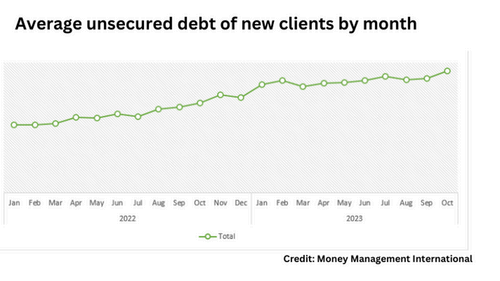Key Advisors Wealth Management co-founder and CEO Eddie Ghabour discusses the state of the consumer ahead of the 2023 holiday shopping season on Varney & Co.
While a record-breaking number of Americans engaged in shopping over the Thanksgiving holiday weekend, nonprofit financial counselors also saw a significant boost in requests for debt counseling during the holiday shopping season kick-off.
Money Management International (MMI), one of the largest non-profit credit counseling agencies in the U.S., says it received a 44% year-over-year boost in the number of consumers seeking its services during the week of Thanksgiving, and a staggering 80% spike in calls on Cyber Monday.

While Americans shopped in record numbers during the unofficial launch of the holiday shopping season, a major credit counseling service received a significant rise in inquiries. (Robert Nickelsberg/Getty Images / Getty Images)
Thomas Nitzsche, MMI’s senior director for media and brand, told FOX Business the surge of inquiries over the past few weeks is very unusual, because this is typically the time of year that the agency sees a decrease in new clients.
In a typical year, he explained, MMI sees a notable decrease in calls during November and December, with an uptick in January and February as the holiday bills hit and folks set financial resolutions for the new year.
MORE FAMILIES LOST FAITH IN ‘AMERICAN DREAM’ IN LAST 5 YEARS: investigate
But the recent surge is not entirely surprising, Nitzsche says, pointing out there has also been a steady boost in the number of consumers seeking credit counseling over the last 18 months across almost all age groups. In addition, the average level of total unsecured debt among consumers seeking debt help has also steadily risen from around $20,000 to almost $30,000 during the same time frame.

Average unsecured debt of new MMI clients by month (MMI / Fox News)
The number of new clients and level of their unsecured debt also aren’t the only increases MMI is seeing: Non-mortgage secured debt (a vehicle for most people) among new clients is up 11% over last year, now averaging $24,000 while mortgage debt among new clients is up 16% this year over last, now averaging $234,000.
MANY OLDER AMERICANS HAVING DIFFICULTY MANAGING DEBT, AARP SURVEY INDICATES
“We think that a combination of post-pandemic spending, elevated interest rates, and the reality of restarted student loan payments are all catching up with vulnerable consumers… both those who are lower-income and those with little savings who carry significant unsecured debt from month to month,” Nitzche said.
NatWest Markets U.S. head Michelle Girard discusses the state of the American consumer after spending slowed in October on ‘Making Money.’
He said a loan balance that used to be manageable with lower interest rates is unmanageable now that rates are so high, and for young people, this is often the first time they have ever experienced higher interest rates.
GET FOX BUSINESS ON THE GO BY CLICKING HERE
Although inflation has cooled, he noted, the cost of goods remains high, and salaries haven’t kept up. Housing costs are less volatile than last year, but they’ve still been rising since January and Nitzche believes they will continue to do so as higher interest rates begin to affect more and more multifamily rental properties.
“Slower inflation isn’t providing people with any relief, it’s just preventing some potential additional hardship,” Nitzche said. “Unless the price of goods goes down or salaries boost, this trend is going to continue for a while.”



